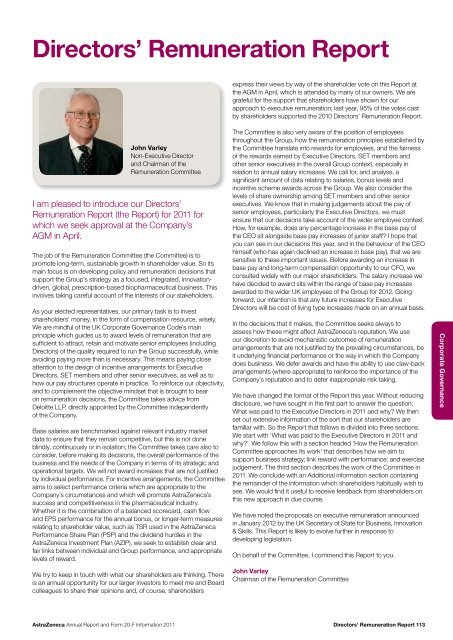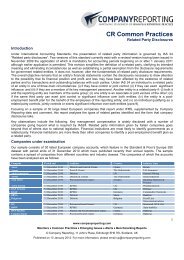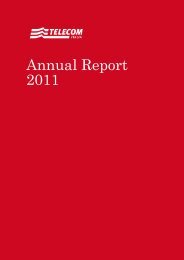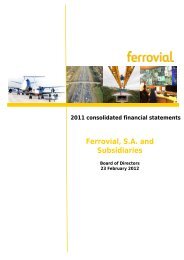AstraZeneca Annual Report and Form 20-F Information 2011
AstraZeneca Annual Report and Form 20-F Information 2011
AstraZeneca Annual Report and Form 20-F Information 2011
- No tags were found...
You also want an ePaper? Increase the reach of your titles
YUMPU automatically turns print PDFs into web optimized ePapers that Google loves.
Directors’ Remuneration <strong>Report</strong>express their views by way of the shareholder vote on this <strong>Report</strong> atthe AGM in April, which is attended by many of our owners. We aregrateful for the support that shareholders have shown for ourapproach to executive remuneration; last year, 95% of the votes castby shareholders supported the <strong>20</strong>10 Directors’ Remuneration <strong>Report</strong>.John VarleyNon-Executive Director<strong>and</strong> Chairman of theRemuneration CommitteeI am pleased to introduce our Directors’Remuneration <strong>Report</strong> (the <strong>Report</strong>) for <strong>20</strong>11 forwhich we seek approval at the Company’sAGM in April.The job of the Remuneration Committee (the Committee) is topromote long-term, sustainable growth in shareholder value. So itsmain focus is on developing policy <strong>and</strong> remuneration decisions thatsupport the Group’s strategy as a focused, integrated, innovationdriven,global, prescription-based biopharmaceutical business. Thisinvolves taking careful account of the interests of our stakeholders.As your elected representatives, our primary task is to investshareholders’ money, in the form of compensation resource, wisely.We are mindful of the UK Corporate Governance Code’s mainprinciple which guides us to award levels of remuneration that aresufficient to attract, retain <strong>and</strong> motivate senior employees (includingDirectors) of the quality required to run the Group successfully, whileavoiding paying more than is necessary. This means paying closeattention to the design of incentive arrangements for ExecutiveDirectors, SET members <strong>and</strong> other senior executives, as well as tohow our pay structures operate in practice. To reinforce our objectivity,<strong>and</strong> to complement the objective mindset that is brought to bearon remuneration decisions, the Committee takes advice fromDeloitte LLP, directly appointed by the Committee independentlyof the Company.Base salaries are benchmarked against relevant industry marketdata to ensure that they remain competitive, but this is not doneblindly, continuously or in isolation; the Committee takes care also toconsider, before making its decisions, the overall performance of thebusiness <strong>and</strong> the needs of the Company in terms of its strategic <strong>and</strong>operational targets. We will not award increases that are not justifiedby individual performance. For incentive arrangements, the Committeeaims to select performance criteria which are appropriate to theCompany’s circumstances <strong>and</strong> which will promote <strong>AstraZeneca</strong>’ssuccess <strong>and</strong> competitiveness in the pharmaceutical industry.Whether it is the combination of a balanced scorecard, cash flow<strong>and</strong> EPS performance for the annual bonus, or longer-term measuresrelating to shareholder value, such as TSR used in the <strong>AstraZeneca</strong>Performance Share Plan (PSP) <strong>and</strong> the dividend hurdles in the<strong>AstraZeneca</strong> Investment Plan (AZIP), we seek to establish clear <strong>and</strong>fair links between individual <strong>and</strong> Group performance, <strong>and</strong> appropriatelevels of reward.We try to keep in touch with what our shareholders are thinking. Thereis an annual opportunity for our larger investors to meet me <strong>and</strong> Boardcolleagues to share their opinions <strong>and</strong>, of course, shareholdersThe Committee is also very aware of the position of employeesthroughout the Group, how the remuneration principles established bythe Committee translate into rewards for employees, <strong>and</strong> the fairnessof the rewards earned by Executive Directors, SET members <strong>and</strong>other senior executives in the overall Group context, especially inrelation to annual salary increases. We call for, <strong>and</strong> analyse, asignificant amount of data relating to salaries, bonus levels <strong>and</strong>incentive scheme awards across the Group. We also consider thelevels of share ownership among SET members <strong>and</strong> other seniorexecutives. We know that in making judgements about the pay ofsenior employees, particularly the Executive Directors, we mustensure that our decisions take account of the wider employee context.How, for example, does any percentage increase in the base pay ofthe CEO sit alongside base pay increases of junior staff? I hope thatyou can see in our decisions this year, <strong>and</strong> in the behaviour of the CEOhimself (who has again declined an increase in base pay), that we aresensitive to these important issues. Before awarding an increase inbase pay <strong>and</strong> long-term compensation opportunity to our CFO, weconsulted widely with our major shareholders. The salary increase wehave decided to award sits within the range of base pay increasesawarded to the wider UK employees of the Group for <strong>20</strong>12. Goingforward, our intention is that any future increases for ExecutiveDirectors will be cost of living type increases made on an annual basis.In the decisions that it makes, the Committee seeks always toassess how these might affect <strong>AstraZeneca</strong>’s reputation. We useour discretion to avoid mechanistic outcomes of remunerationarrangements that are not justified by the prevailing circumstances, beit underlying financial performance or the way in which the Companydoes business. We defer awards <strong>and</strong> have the ability to use claw-backarrangements (where appropriate) to reinforce the importance of theCompany’s reputation <strong>and</strong> to deter inappropriate risk taking.We have changed the format of the <strong>Report</strong> this year. Without reducingdisclosure, we have sought in the first part to answer the question:What was paid to the Executive Directors in <strong>20</strong>11 <strong>and</strong> why? We thenset out extensive information of the sort that our shareholders arefamiliar with. So the <strong>Report</strong> that follows is divided into three sections.We start with ‘What was paid to the Executive Directors in <strong>20</strong>11 <strong>and</strong>why?’. We follow this with a section headed ‘How the RemunerationCommittee approaches its work’ that describes how we aim tosupport business strategy; link reward with performance; <strong>and</strong> exercisejudgement. The third section describes the work of the Committee in<strong>20</strong>11. We conclude with an Additional information section containingthe remainder of the information which shareholders habitually wish tosee. We would find it useful to receive feedback from shareholders onthis new approach in due course.We have noted the proposals on executive remuneration announcedin January <strong>20</strong>12 by the UK Secretary of State for Business, Innovation& Skills. This <strong>Report</strong> is likely to evolve further in response todeveloping legislation.On behalf of the Committee, I commend this <strong>Report</strong> to you.John VarleyChairman of the Remuneration CommitteeCorporate Governance<strong>AstraZeneca</strong> <strong>Annual</strong> <strong>Report</strong> <strong>and</strong> <strong>Form</strong> <strong>20</strong>-F <strong>Information</strong> <strong>20</strong>11Directors’ Remuneration <strong>Report</strong> 113










